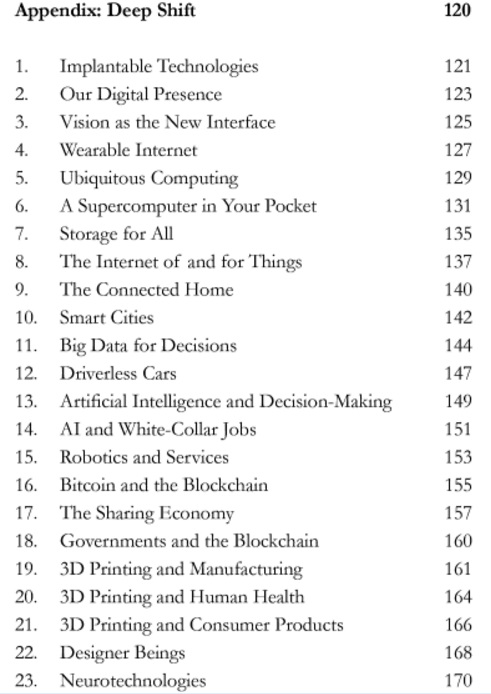Dear Commons Community,
I have just finished reading The Fourth Industrial Revolution by Klaus Schwab. Schwab is the founder and executive director of the World Economic forum and brings a globalization perspective to the issue of technology-advancement. He is convinced that the period of change (The Fourth Industrial Revolution) we are living through is more significant, and the ramifications of the latest technological revolution more profound than any prior period of human history. He examines the future and asks how we might take collective responsibility to ensure it is a positive one for all of us. He concludes with an appendix of twenty-three technologies (see list below) that can have a major impact on how we live, work and function in society. One reviewer commented:
“This is a first-rate and timely overview of the most extensive and profound transformation of the technological landscape in more than two centuries since the [first] Industrial Revolution. This transformation – the product of sustained research and development at an unprecedented scale over several decades, in congruent and conflating info-, bio-, nano-, neuro- and cogno-technologies, is already disrupting social structures, business models, the conduct of warfare, and the workings of both democratic and authoritarian polities around the world.”
Another reviewer cautions:
“There should be little doubt now that a revolution is already being detonated inside global labour and career markets. And Dr. Schwab’s emphasis on this very theme is absolutely correct. But the elimination of income-bearing professions – from Davos to Delhi to Denver – needs urgent analysis of a quality that can lead to practical advice for companies and governments. How actually to preserve lifelong income flows for consumer-citizens? How to adjust universities to cope in utterly radical ways with adults who will, across their lives, need three degrees in order to give themselves a fighting chance of sustainable revenue (as their old skills die faster than species)? How specifically should the language of recruitment now change so that employers and college-leavers alike can share a coherent understanding of how long job contracts (and the commitments they imply) can be expected to last? A negative kind of rapture is busy engulfing the entire culture of career as we have always known it in the West – and we need precision and purpose in the answers we offer.”
I don’t have the answers but Schwab raises the issue that we had better start taking all of this most seriously.
Tony


